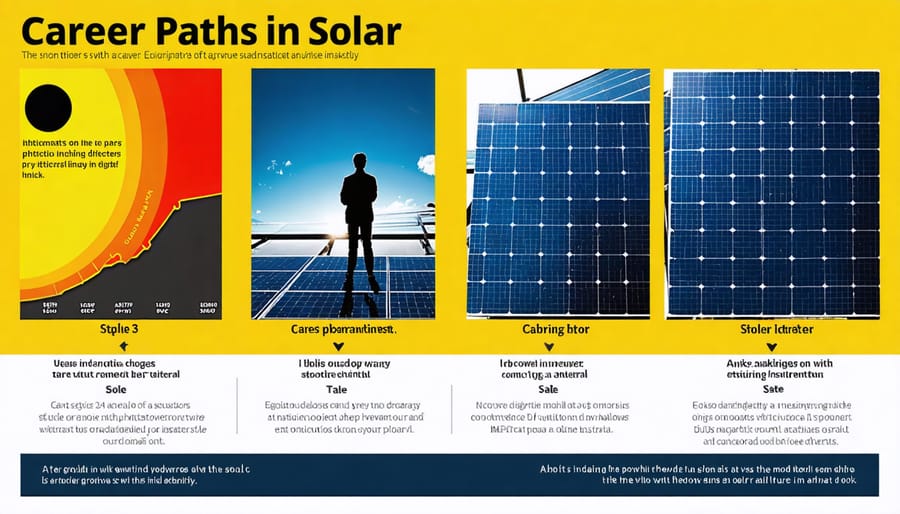Solar policies are reshaping America’s energy landscape and creating unprecedented opportunities in the booming solar job market. From federal tax incentives to state-level renewable portfolio standards, these policies are driving massive industry growth and transforming how homeowners and businesses approach energy consumption. The Inflation Reduction Act alone has injected $369 billion into clean energy initiatives, creating a watershed moment for solar adoption across the United States. Whether you’re a homeowner considering solar installation or a professional exploring career opportunities, understanding current solar policies is crucial for making informed decisions about your energy future. These regulations not only make solar more accessible and affordable but also create sustainable jobs, reduce carbon emissions, and establish a framework for America’s transition to renewable energy.

Major Solar Policy Shifts Driving Job Growth
Federal Investment Tax Credit Impact
The Federal Investment Tax Credit (ITC) has been a driving force behind the remarkable growth of America’s solar industry. Since its implementation, this incentive has helped create hundreds of thousands of jobs while making solar more accessible to homeowners. The recent extension and enhancement of the ITC through the Inflation Reduction Act has set the stage for even more impressive growth, with the credit now fixed at 30% through 2032.
This stability has already shown positive results, with solar installation companies expanding their workforce and manufacturers increasing production capacity. Industry analysts project that the extended ITC will help create an additional 200,000 solar-related jobs by 2025. These positions range from installers and technicians to sales representatives and project managers.
The economic impact extends beyond direct solar jobs. For every solar installation project, related industries such as construction, electrical work, and transportation also see increased demand. This multiplier effect strengthens local economies and creates sustainable career opportunities across various sectors. The ITC’s predictable timeline also encourages long-term investment in training programs and infrastructure, setting up the solar industry for sustained growth over the next decade.
State-Level Incentives and Requirements
State-level solar policies have created a vibrant job market across different regions of the United States. California leads the way with its ambitious renewable energy goals, requiring solar panels on most new homes and creating thousands of installation and maintenance positions. Massachusetts and New York have implemented strong solar incentive programs that have sparked growth in solar consulting and sales roles.
Many states offer tax credits, rebates, and grants specifically designed to encourage solar business development. For example, Nevada’s renewable portfolio standard has led to the establishment of large solar farms, creating positions in project management and technical operations. Similarly, Arizona’s solar policies have fostered a growing network of local installers and distributors.
States like Illinois and Virginia have recently expanded their solar initiatives, opening up new opportunities in system design, energy assessment, and customer education. These policies often include workforce development programs, providing training and certification pathways for those entering the industry. The state-level commitment to solar energy continues to drive job creation, particularly in urban areas and developing solar corridors.

Emerging Career Paths in Solar
Technical Roles
Technical roles in the solar industry offer diverse opportunities for professionals with varying skill sets. Solar installers form the backbone of the implementation team, requiring physical dexterity and technical knowledge to properly mount and connect solar systems. These professionals ensure panels are correctly positioned for maximum sunlight exposure and secure installation.
Design specialists play a crucial role in planning optimal solar array layouts, considering factors like roof architecture, shade patterns, and local weather conditions. They work closely with homeowners to create systems that balance aesthetics with efficiency, contributing to ongoing solar technology innovation.
Solar engineers oversee the technical aspects of projects, from initial assessment to final implementation. They calculate energy requirements, design electrical systems, and ensure compliance with local building codes and safety regulations. These professionals often specialize in areas like electrical, mechanical, or structural engineering to address specific project needs.
Quality control specialists verify installations meet industry standards and perform regular maintenance checks. They use specialized equipment to test system performance and troubleshoot any issues that arise. Project managers coordinate these various roles, ensuring smooth collaboration between teams and timely project completion while maintaining budget constraints.
These positions typically require certification from recognized institutions, and many professionals start with apprenticeships or technical training programs. The field offers excellent growth potential as the solar industry continues to expand and evolve.
Business Development and Sales
The solar industry presents numerous business opportunities as policies continue to support market growth. Homeowners and businesses are increasingly turning to solar solutions, creating a robust marketplace for sales professionals and entrepreneurs. The combination of federal tax incentives, state-level rebates, and growing consumer awareness has created fertile ground for business development.
Solar companies are expanding their operations through various sales channels, including direct-to-consumer marketing, partnerships with home improvement retailers, and business-to-business solutions. Many organizations are finding success with educational marketing approaches that help customers understand both the environmental and financial benefits of solar installation.
The market has also seen innovation in financing options, with solar leasing programs and power purchase agreements making solar more accessible to a broader customer base. These financial products have opened new avenues for sales professionals to connect with previously untapped market segments.
Local utilities and energy companies are increasingly partnering with solar providers, creating additional opportunities for business development professionals. These partnerships often result in community solar projects and group purchasing programs that benefit both providers and consumers.
For those entering the field, the most successful approach combines technical knowledge with strong relationship-building skills. Understanding both the technology and available incentives helps sales professionals address customer concerns effectively and close deals. As policies continue to evolve favorably, the potential for business growth in the solar sector remains highly promising.
Market Regulations Shaping Professional Requirements
Certification Requirements
To work in the solar industry, professionals typically need specific certifications that validate their expertise and ensure safety standards. The North American Board of Certified Energy Practitioners (NABCEP) certification is the most widely recognized credential, particularly for solar installers and technical sales professionals. This certification requires passing an exam and completing hands-on installation experience.
For those starting their solar career, entry-level certificates like the NABCEP Associate Program provide a solid foundation. These can be obtained through accredited training programs at technical schools or community colleges. Many states also require electrical licenses for solar installations, which typically involve completing apprenticeship hours and passing state-specific exams.
Professional engineers working on large-scale solar projects need state-specific PE licenses, while solar sales professionals often pursue additional certifications in renewable energy sales and system design. Most certifications require ongoing education to maintain validity, ensuring professionals stay current with evolving technologies and safety standards.
Online courses and workshops are available to help prepare for certification exams, with many programs offering both theoretical knowledge and practical training components.

Compliance and Safety Standards
Understanding and following compliance and safety standards is crucial for anyone involved in solar energy implementation. All solar installations must meet National Electrical Code (NEC) requirements, which are updated every three years to ensure maximum safety and efficiency. These standards cover everything from proper wiring techniques to equipment specifications.
Local building codes also play a vital role in solar installations. Most jurisdictions require permits and inspections before, during, and after installation. Homeowners should ensure their contractors are familiar with these local requirements and obtain all necessary permits.
Safety standards extend beyond installation to maintenance and operation. The Occupational Safety and Health Administration (OSHA) provides specific guidelines for working with solar equipment, including fall protection requirements for roof installations and electrical safety protocols.
For grid-connected systems, utility companies often have their own interconnection requirements. These standards ensure that solar systems can safely connect to the power grid without causing disruptions or safety hazards. Understanding these requirements early in the planning process can help avoid costly modifications later.
Remember that compliance isn’t just about following rules – it’s about ensuring your solar investment is safe, reliable, and properly protected.
Future Outlook and Opportunities
The solar industry is poised for remarkable growth in the coming decades, driven by technological innovations, declining costs, and strengthening policy support. Industry projections suggest that solar installations could triple by 2030, creating numerous employment opportunities across various sectors. From installation technicians to policy analysts, the field offers diverse career paths, with particularly promising solar supply chain opportunities emerging as manufacturing capabilities expand domestically.
Recent federal and state initiatives are expected to catalyze significant market growth, with tax incentives and renewable portfolio standards driving demand for solar professionals. The Inflation Reduction Act alone is projected to create over 500,000 clean energy jobs by 2030, with solar playing a central role in this expansion.
Looking ahead, we can expect to see new opportunities in emerging areas such as solar-plus-storage systems, smart grid integration, and building-integrated photovoltaics. The increasing focus on environmental sustainability and energy independence will likely lead to more robust policy support at all government levels, further strengthening the industry’s growth trajectory.
For homeowners and businesses, these developments mean greater access to solar solutions, more competitive pricing, and improved technology options. The combination of falling costs, enhanced efficiency, and supportive policies creates an ideal environment for solar adoption, suggesting a bright future for both consumers and professionals in the field.
As climate goals become more urgent and energy security concerns grow, the solar sector is well-positioned to play a pivotal role in our energy future, offering stable, rewarding career opportunities for those looking to make a positive impact while building a sustainable career.
The evolving landscape of solar policies presents exciting opportunities for homeowners and environmentally conscious individuals. By staying informed about local incentives, federal tax credits, and renewable energy programs, you can make educated decisions about solar adoption that benefit both your wallet and the planet. Remember to regularly check for policy updates, connect with local solar installers, and participate in community solar initiatives when available. Take advantage of current incentives while they last, and consider joining local advocacy groups to support renewable energy policies. With proper research and timing, you can maximize the financial benefits of going solar while contributing to a more sustainable future. The path to solar adoption is clearer than ever, supported by increasingly favorable policies and growing community awareness.









